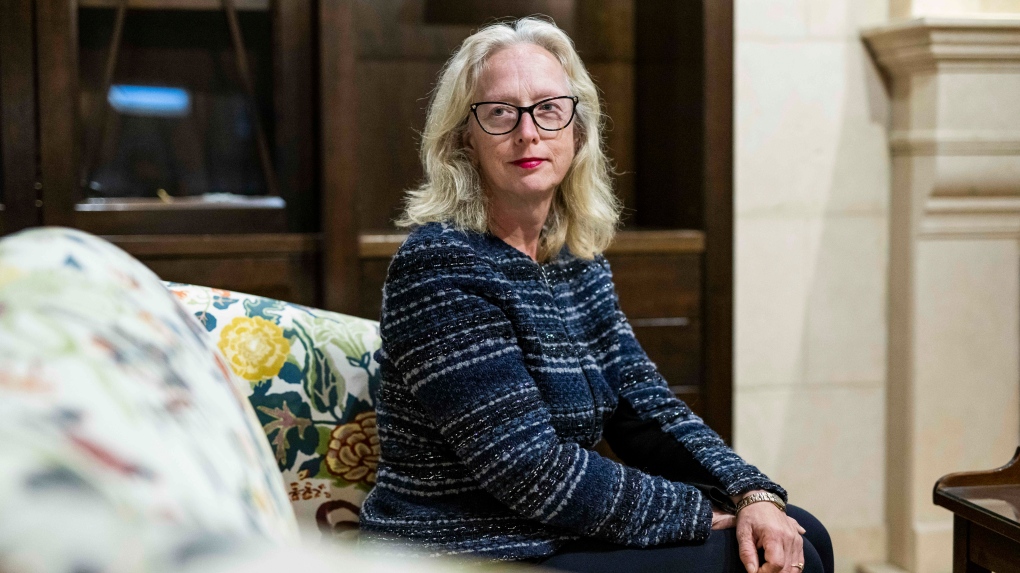加拿大驻华大使:中国不是“对手”,中加关系复杂、多面且非常重要
 齐倩邮箱:qiqian@guancha.cn 2023-06-19 观察者网
齐倩邮箱:qiqian@guancha.cn 2023-06-19 观察者网
(观察者网讯)近几个月以来,加拿大方面不仅在贸易和“间谍气球”事件上紧跟美国,还不断炒作所谓“中国干预选举”话题,造成中加关系紧张。但加拿大驻华大使梅倩琳(Jennifer May)在接受加拿大电视台(CTV)采访时称,中国并不是加拿大的“对手”,而是一个“复杂的合作伙伴”,中加关系“非常重要”。该采访于当地时间6月18日播出。

梅倩琳在节目中告诉主持人,加拿大和中国有着“复杂”、“多面”和“非常重要”的关系。她认为,处理两国关系时,重要的是要关注双方的共同目标,比如气候变化和环境、贸易和投资。
当被问及是否会将中加关系描述为“敌对关系”时,梅倩琳回答:“不会(would not)”。她表示:“我认为中国是一个复杂的合作伙伴。在某些领域,他们是合作伙伴;在另一些领域,他们更像是竞争对手。但我不认为我们可以用一两个词语总结中国这样一个大而复杂的国家或中加关系。”
她认为,中加两国之间保持开放性对话很重要,加拿大外长同中方的对话是开放的。但她没有透露加拿大是否正在计划对中国进行高层访问。
梅倩琳还谈到了台海问题,声称加拿大应在面对中方“激进行为”时“不退缩”。但被问及加拿大是否应以牙还牙时,她补充说,重点应该是采取“坚定有力的行动,而不一定是咄咄逼人的行动”。
值得一提的是,梅倩琳在采访中重提所谓的“中国干预选举”话题。
据梅倩琳声称,加拿大处理对华议题时,“应坚决、强烈和明确地反击,就像我们对外国干涉所做的那样。但也需在气候变化和环境等全球问题上伸出援手”。她还说,她已经向中方提出了“干预选举”的话题,明确表示这是“不可接受的行为”。
在提及加拿大驻上海总领馆领事甄逸慧被中方要求限期离境时,梅倩琳开始倒打一耙,用“不幸”一词形容该事件。她同时表示:“虽然中方有权这么做,但我希望中方没有采取措施,关闭我们通过外交官进行对话的主要渠道之一。”

加拿大驻华大使梅倩琳接受采访,视频截图
近一段时间,加拿大媒体和多名政客不断炒作所谓“中国干预选举”话题。
此前,加拿大媒体《环球邮报》与《环球新闻》援引加拿大国家安全机构泄露的消息,声称中方暗中干预了加拿大2019年和2021年的联邦选举,致使特鲁多被反对党政客不断要求“对中方作出回应”。在保守党的压力下,特鲁多3月任命独立特别调查员大卫·约翰斯顿展开调查。
除任命特别调查员外,5月8日,加方还公然宣布中国驻多伦多总领馆一名领事官员为“不受欢迎的人”。据中国外交部网站消息,5月9日,中方决定采取对等反制措施,将加拿大驻上海总领馆领事甄逸慧列为“不受欢迎的人”,已要求其5月13日前离华。中方保留作出进一步反应的权利。
中国驻加拿大大使丛培武5月19日接受彭博社采访时,奉劝加方不要作出进一步挑衅行为,并表示加拿大应该回归更加独立的外交政策,而不是跟随美国的脚步。
5月24日,我外交部发言人毛宁在例行记者会表示,我们已多次强调,中方一贯奉行不干涉别国内政的外交政策,也坚决反对任何国家干涉其他国家的内政。我们没有兴趣,也不会干预加拿大的内政和大选。我们奉劝加方摒弃意识形态偏见和冷战思维,不要总拿中国说事。
China not an adversary to Canada, despite 'complicated' relationship: ambassador
Spencer Van Dyk CTV News Parliamentary Bureau Writer,
Canada’s ambassador to China insists the two countries are not adversaries, despite mounting examples of tense relations and allegations of foreign interference stacking up in recent months.
Jennifer May told CTV’s Question Period host Vassy Kapelos, in an interview airing Sunday, Canada and China have a “complex,” “multifaceted,” and “very important” relationship, but that it’s important to focus on the goals they have in common, such as climate change and the environment, trade and investment.
There have been a series of incidents in recent months that have put the two countries at odds, however: a tense conversation between Prime Minister Justin Trudeau and President Xi Jinping at the G20 summit last fall, multiple allegations of China interfering in Canadian elections, an alleged Chinese spy balloon flying over Canada and the United States, and Canada’s expulsion of a Chinese diplomat following allegations he targeted Conservative MP Michael Chong and his family.
But when asked whether she would describe the relationship between Canada and China as adversarial, May said she “would not.”
“I would describe China as a complex and complicated partner to work with,” she said. “And in some areas, they are a partner, but in others, they are more of a competitor.”
“But I don't think we can take a big complicated country or relationship like China, and put it down into one or two words,” she added.
May also said it’s important to keep the dialogue open.
“It means absolutely pushing back very firmly, strongly and clearly, as we've done on foreign interference, but also where there is an extended hand on issues that are absolutely existential for the entire globe, like climate change and the environment, that we don't throw that baby out with the bathwater,” she said.
The ambassador also said she’s raised the issue of foreign interference with senior levels of China’s foreign ministry to make it clear it is “not acceptable behaviour.”
May said China expelling Shanghai-based Canadian diplomat Jennifer Lynn Lalonde — a reciprocal move following Canada’s expulsion of Chinese diplomat Zhao Wei — was “unfortunate,” but “could have been worse.”
“That was very difficult,” she said. “My colleague had to leave on very short notice with her family. So yeah, that has had an impact on us very directly on the ground as well.”
“I wish that they had not taken the step of closing down essentially one of our channels of dialogue through our diplomat, but it is their right to do so,” she also said.
Relations between China and Canada’s closest ally, the United States, have also been strained. U.S. National Security Council spokesperson John Kirby told Kapelos earlier this month China’s recent actions in the Taiwan Straight are increasingly “aggressive.”
“I think we are seeing them taking aggressive actions for sure,” May said. “We see them as disrupting, trying to play with the rules around the margins, around the game.”
“But I think that's where we also are stepping up with confidence and making sure that that we're not backing down in the face of that kind of change to the normal status quo,” she added.
But when asked whether Canada should respond in kind, May said the focus should instead be on acting “determined and forceful, rather than necessarily aggressive.”
American officials meanwhile very recently have said they want to reset the relationship through diplomacy.
In that vein, U.S. Secretary of State Antony Blinken is set to visit Beijing on Sunday, after a trip in February was postponed due to the Chinese balloon incident.
May said the lines of dialogue are open between Canadian Foreign Affairs Minister Melanie Joly and her counterpart in China, but wouldn’t say whether plans for a high level Canadian visit to China is in the works.

Jennifer May, Canada's Ambassador to China, is shown in Ottawa, on Wednesday, Sept. 28, 2022. THE CANADIAN PRESS/Justin Tang